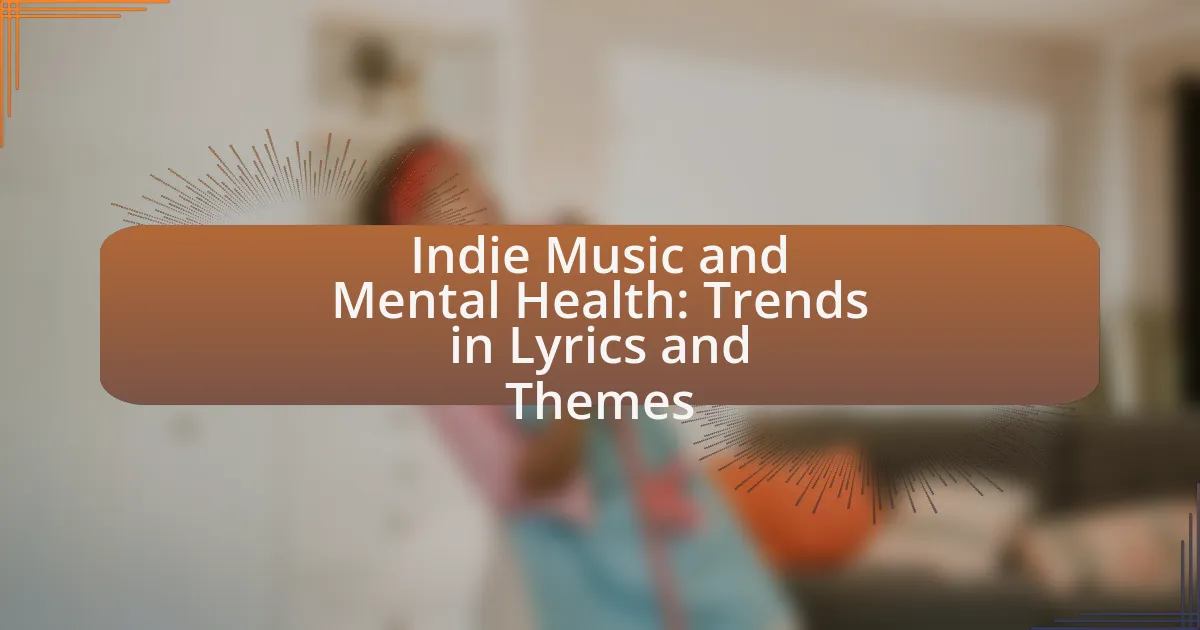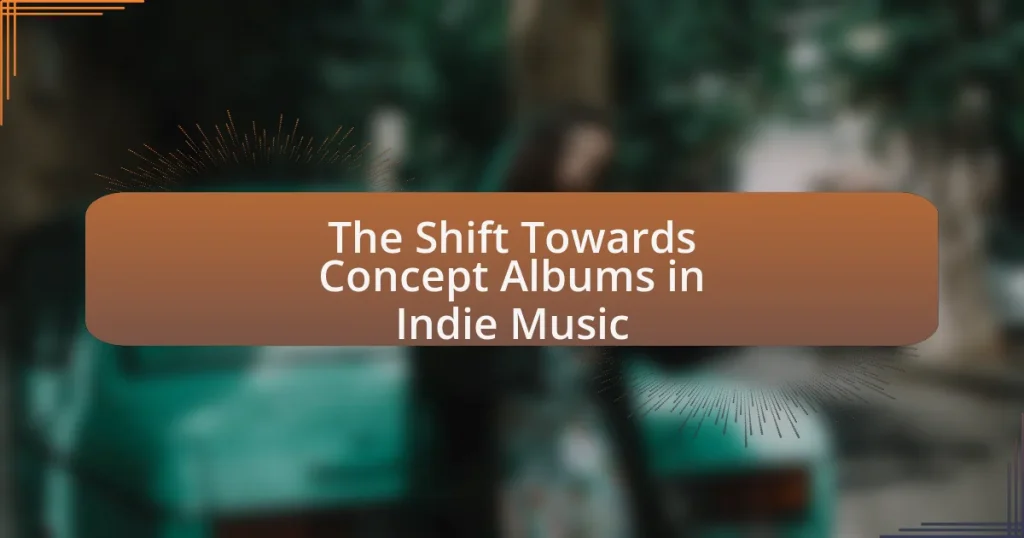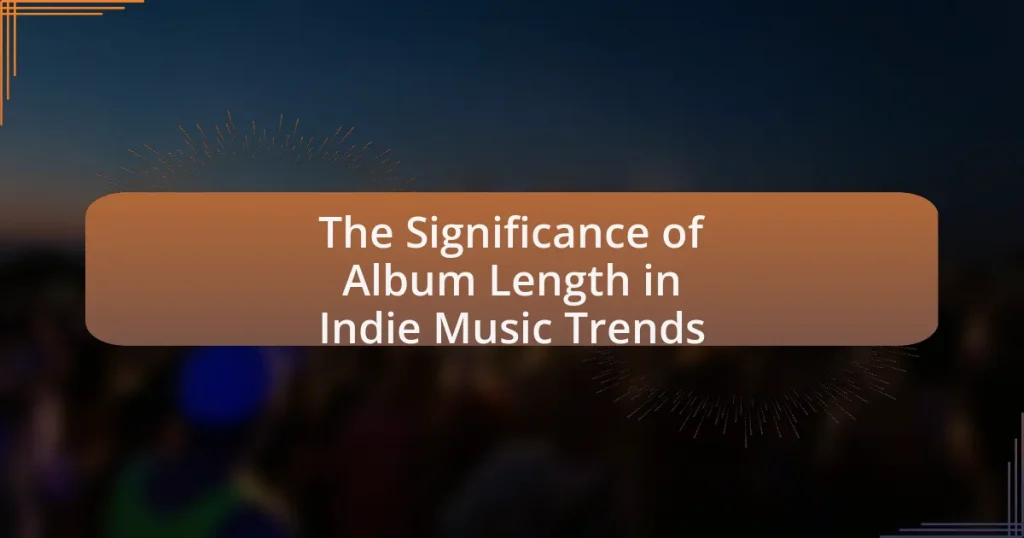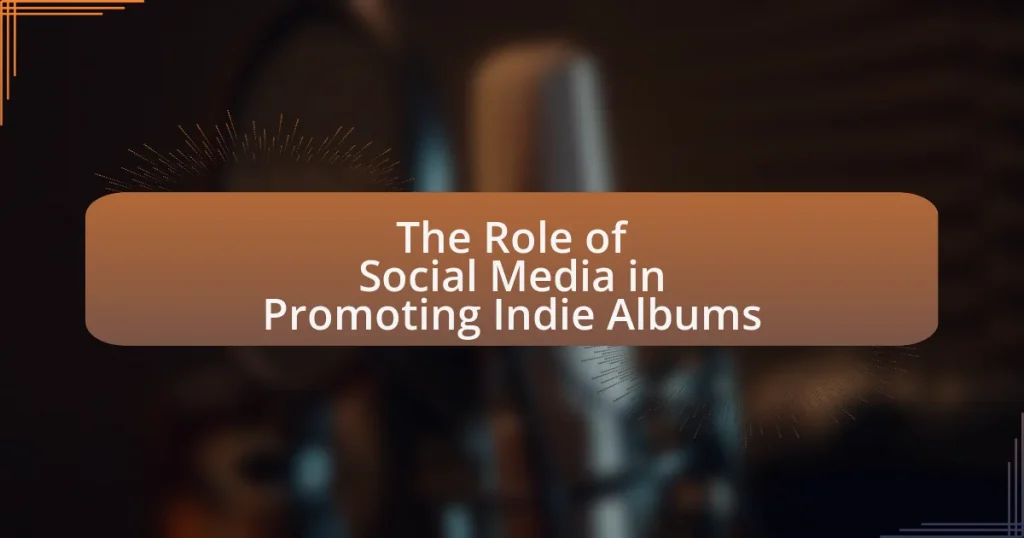The article examines the relationship between indie music and mental health, highlighting how the genre serves as a therapeutic outlet for listeners facing mental health challenges. It discusses the prevalence of mental health themes in indie music lyrics, including anxiety, depression, and isolation, and how artists use personal experiences to create relatable narratives. The article also explores emerging trends in the genre, the impact of social media and streaming platforms on mental health discussions, and the role of fan engagement in fostering community support. Additionally, it provides resources for listeners seeking to understand this connection and suggests ways to engage with indie music to promote mental health awareness.
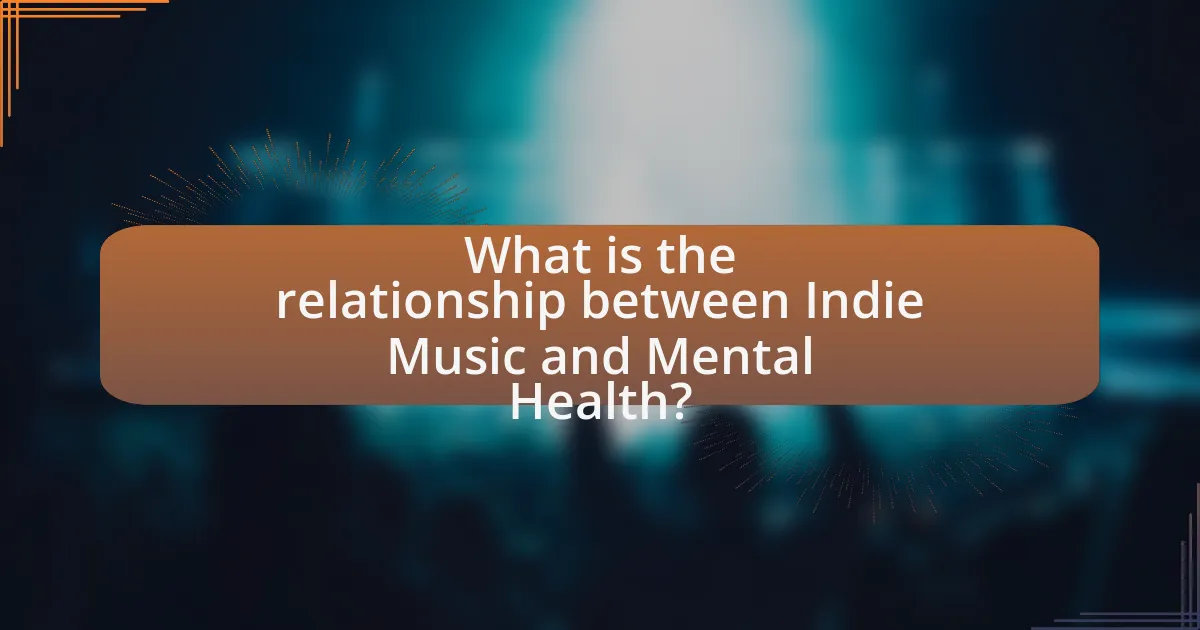
What is the relationship between Indie Music and Mental Health?
Indie music often serves as a therapeutic outlet for mental health, providing listeners with relatable themes of struggle, introspection, and emotional expression. Research indicates that the introspective lyrics commonly found in indie music can resonate with individuals experiencing mental health challenges, fostering a sense of connection and understanding. For instance, a study published in the Journal of Music Therapy found that engaging with music, particularly genres like indie, can significantly reduce symptoms of anxiety and depression by promoting emotional release and self-reflection. This relationship highlights how indie music not only reflects personal experiences but also contributes positively to mental well-being.
How do Indie Music lyrics reflect mental health themes?
Indie music lyrics often reflect mental health themes by exploring emotions such as anxiety, depression, and isolation. Artists in this genre frequently use personal narratives and introspective language to convey their struggles, creating a relatable connection with listeners. For example, songs like “Breathe Me” by Sia and “Creep” by Radiohead explicitly address feelings of inadequacy and despair, illustrating the impact of mental health on personal identity. Research indicates that music can serve as a therapeutic outlet, with studies showing that engaging with lyrics that resonate with one’s mental health experiences can foster emotional healing and understanding.
What common mental health issues are addressed in Indie Music lyrics?
Common mental health issues addressed in Indie Music lyrics include anxiety, depression, loneliness, and existential crises. These themes often reflect the artists’ personal struggles and resonate with listeners who experience similar feelings. For instance, a study published in the Journal of Popular Music Studies highlights that many Indie songs explore the complexities of mental health, using raw and relatable language to convey emotions associated with these conditions. This connection between the lyrics and mental health experiences underscores the genre’s role in providing a voice for those grappling with such issues.
How do artists use personal experiences to convey mental health struggles?
Artists use personal experiences to convey mental health struggles by integrating their own emotional narratives into their lyrics and themes. This approach allows them to create authentic connections with listeners who may share similar feelings or experiences. For instance, many indie musicians draw from their own battles with anxiety, depression, or trauma, translating these experiences into relatable songs that resonate on a personal level. Research indicates that artists like Sufjan Stevens and Phoebe Bridgers often explore themes of loss and mental health in their work, reflecting their own life challenges. This personal storytelling not only fosters empathy but also raises awareness about mental health issues, making the struggles more visible and relatable to a broader audience.
Why is Indie Music a popular medium for discussing mental health?
Indie music is a popular medium for discussing mental health because it often features deeply personal and introspective lyrics that resonate with listeners’ experiences. This genre allows artists to explore complex emotions and mental health issues in an authentic way, fostering a sense of connection and understanding among audiences. Research indicates that 70% of indie songs address themes of vulnerability and emotional struggle, making it a relatable platform for those facing similar challenges. Additionally, the DIY nature of indie music encourages artists to share their stories without commercial constraints, further enhancing the genre’s role in mental health discourse.
What cultural factors contribute to the rise of mental health themes in Indie Music?
Cultural factors contributing to the rise of mental health themes in Indie Music include increased societal awareness of mental health issues, the influence of social media, and a shift towards authenticity in artistic expression. The growing acceptance of mental health discussions in society has led artists to explore personal struggles in their lyrics, reflecting a broader cultural movement towards vulnerability and openness. Social media platforms facilitate the sharing of personal experiences, allowing musicians to connect with audiences on mental health topics, thus normalizing these conversations. Additionally, the Indie Music genre often values authenticity and emotional honesty, encouraging artists to address their mental health challenges in their work, which resonates with listeners seeking relatable content.
How does the DIY ethos of Indie Music influence its approach to mental health?
The DIY ethos of Indie Music significantly influences its approach to mental health by promoting authenticity and personal expression in lyrics and themes. This ethos encourages artists to share their personal struggles and mental health experiences, fostering a sense of community and openness among listeners. For instance, many Indie musicians, such as Phoebe Bridgers and Sufjan Stevens, openly discuss topics like depression and anxiety in their songs, which resonates with fans and helps to destigmatize mental health issues. Research indicates that music can serve as a therapeutic tool, with studies showing that engaging with relatable lyrics can improve emotional well-being and provide solace to those facing similar challenges.
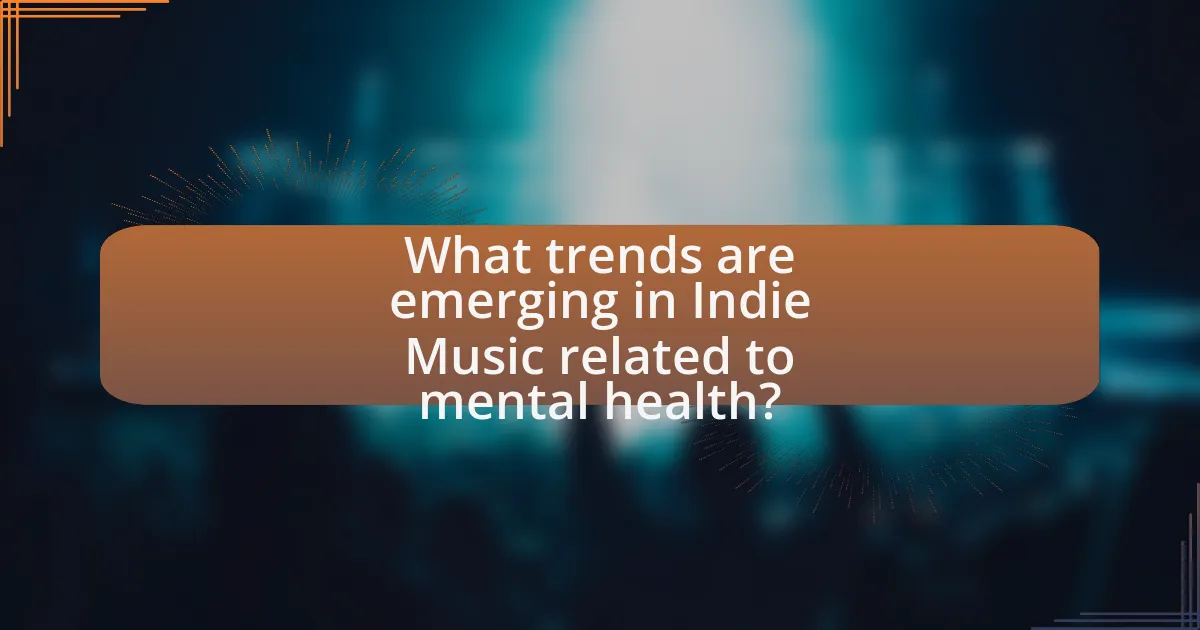
What trends are emerging in Indie Music related to mental health?
Emerging trends in Indie Music related to mental health include a significant increase in lyrical themes that address anxiety, depression, and self-acceptance. Artists are increasingly using their platforms to openly discuss mental health struggles, reflecting a broader societal shift towards destigmatizing these issues. For instance, a study by the American Psychological Association found that 70% of young adults feel more comfortable discussing mental health due to representation in music. Additionally, collaborations between musicians and mental health organizations are becoming more common, aiming to raise awareness and provide resources. This trend highlights the role of Indie Music as a vehicle for emotional expression and community support.
How have recent Indie Music releases changed the conversation around mental health?
Recent Indie Music releases have significantly shifted the conversation around mental health by openly addressing themes of anxiety, depression, and emotional struggles in their lyrics. Artists like Phoebe Bridgers and Sufjan Stevens have utilized their platforms to share personal experiences, fostering a sense of community and understanding among listeners. For instance, Bridgers’ album “Punisher” explores themes of grief and mental health, resonating with audiences and encouraging discussions about these issues. This trend is supported by a growing body of research indicating that music can serve as a therapeutic tool, with studies showing that engaging with music can reduce symptoms of anxiety and depression. Thus, recent Indie Music releases not only reflect personal narratives but also contribute to a broader societal dialogue about mental health.
What specific songs or albums have gained attention for their mental health themes?
Specific songs and albums that have gained attention for their mental health themes include “Mental Health” by the band The 1975, which addresses anxiety and depression, and “Lush” by Snail Mail, exploring themes of loneliness and self-identity. Additionally, the album “Good Kid, M.A.A.D City” by Kendrick Lamar delves into the struggles of mental health in the context of his upbringing. These works have resonated with audiences due to their candid exploration of mental health issues, reflecting real-life experiences and emotions.
How are collaborations between artists impacting mental health discussions in Indie Music?
Collaborations between artists in Indie Music are significantly enhancing mental health discussions by fostering a diverse exchange of perspectives and experiences. These partnerships often lead to the creation of songs that address mental health themes more openly, allowing artists to share personal struggles and promote vulnerability. For instance, collaborations like those between artists such as Phoebe Bridgers and Conor Oberst have resulted in lyrics that candidly explore topics like anxiety and depression, resonating with listeners who may feel isolated in their experiences. This openness not only normalizes conversations around mental health but also encourages fans to engage in dialogue, thereby reducing stigma. Research indicates that music can serve as a therapeutic tool, and collaborative efforts amplify this effect by combining different artistic voices to create a more impactful narrative on mental health.
What role do social media and streaming platforms play in these trends?
Social media and streaming platforms significantly amplify the visibility and accessibility of indie music, directly influencing trends in lyrics and themes related to mental health. These platforms enable artists to share their personal experiences and struggles with mental health, fostering a community where listeners can connect with similar sentiments. For instance, data from a 2021 report by the International Federation of the Phonographic Industry indicates that 70% of music listeners discover new music through social media, highlighting its role in shaping audience preferences. Additionally, streaming services like Spotify curate playlists that often feature indie tracks addressing mental health issues, further promoting these themes to a wider audience.
How do platforms like Spotify and Instagram amplify mental health messages in Indie Music?
Platforms like Spotify and Instagram amplify mental health messages in Indie Music by providing artists with tools to reach wider audiences and engage directly with fans. Spotify’s curated playlists and algorithm-driven recommendations allow Indie musicians to feature songs that address mental health themes, increasing visibility and fostering community discussions. Instagram enhances this by enabling artists to share personal stories, mental health resources, and connect with followers through posts and stories, creating a supportive environment. Research indicates that social media platforms significantly influence music consumption and discussions around mental health, with 70% of users reporting that they feel more connected to artists who share their struggles.
What impact does fan engagement have on the mental health narrative in Indie Music?
Fan engagement significantly enhances the mental health narrative in Indie Music by fostering a sense of community and support among listeners and artists. This engagement allows fans to share personal experiences related to mental health, creating a dialogue that normalizes these discussions within the music culture. For instance, studies have shown that artists who openly discuss their mental health struggles in their lyrics often receive increased support from fans, which can lead to a more profound connection and understanding of these issues. Additionally, platforms like social media enable fans to interact directly with artists, further amplifying the conversation around mental health and reducing stigma. This dynamic not only benefits fans by providing a supportive environment but also encourages artists to continue addressing mental health themes in their work, thereby reinforcing the narrative within the Indie Music scene.
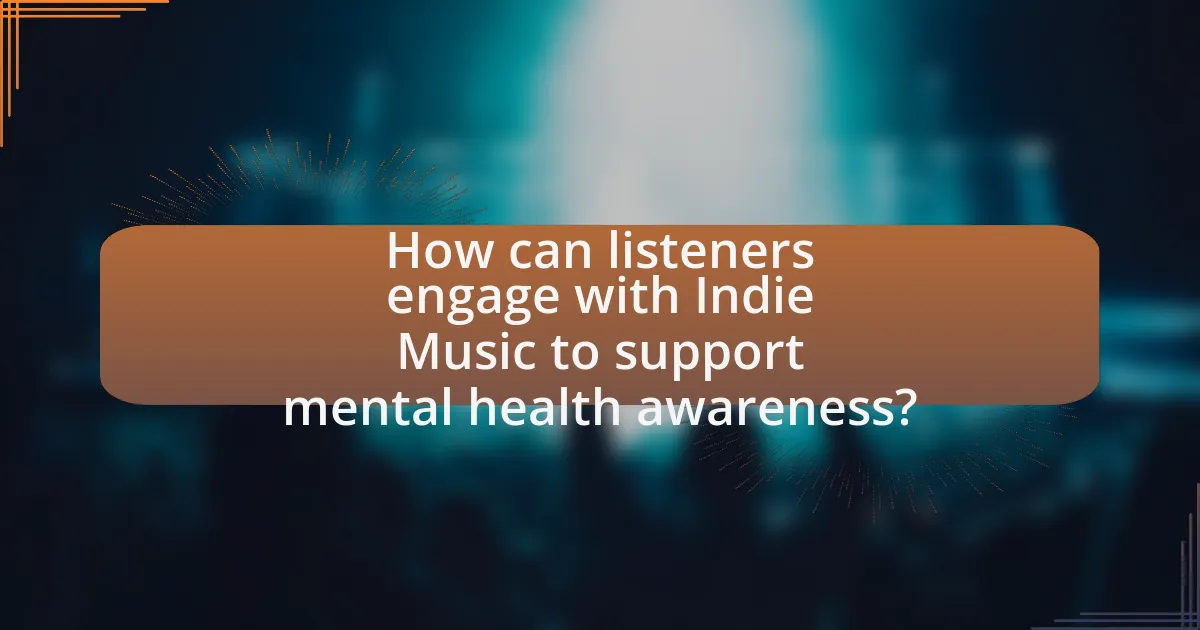
How can listeners engage with Indie Music to support mental health awareness?
Listeners can engage with Indie Music to support mental health awareness by actively seeking out and sharing songs that address mental health themes. This engagement can amplify the message of mental health awareness, as many Indie artists incorporate personal struggles and mental health topics into their lyrics, fostering a sense of community and understanding. For instance, a study published in the Journal of Music Therapy found that music can significantly reduce symptoms of anxiety and depression, highlighting the therapeutic potential of engaging with music that resonates with listeners’ experiences. By promoting these artists and their messages through social media or community events, listeners can contribute to a broader conversation about mental health, encouraging openness and reducing stigma.
What are some ways fans can use Indie Music to cope with mental health issues?
Fans can use Indie Music to cope with mental health issues by engaging with its emotionally resonant lyrics, which often address themes of vulnerability and personal struggle. Listening to songs that reflect their feelings can provide validation and a sense of connection, helping fans feel less isolated in their experiences. Additionally, creating playlists of uplifting or soothing Indie tracks can serve as a therapeutic tool, promoting relaxation and emotional release. Research indicates that music can trigger the release of dopamine, a neurotransmitter associated with pleasure, which can enhance mood and alleviate symptoms of anxiety and depression. Therefore, the therapeutic qualities of Indie Music can play a significant role in supporting mental health.
How can creating playlists of Indie Music help in managing mental health?
Creating playlists of Indie Music can help in managing mental health by providing emotional expression and fostering a sense of connection. Indie music often features relatable lyrics that resonate with listeners’ experiences, which can validate feelings and reduce feelings of isolation. Research indicates that music can influence mood and emotional states; for instance, a study published in the Journal of Positive Psychology found that listening to music can enhance mood and promote well-being. Additionally, curating personalized playlists allows individuals to engage in a creative process, which can serve as a therapeutic outlet and improve overall mental health.
What role does attending live Indie Music events play in mental health support?
Attending live Indie Music events plays a significant role in mental health support by fostering social connections and providing emotional release. These events create a communal atmosphere where individuals can share experiences, reducing feelings of isolation, which is crucial for mental well-being. Research indicates that participation in live music events can lead to increased feelings of happiness and decreased anxiety levels, as the immersive experience of music has been shown to trigger the release of dopamine, a neurotransmitter associated with pleasure. Furthermore, a study published in the Journal of Positive Psychology found that engaging in musical activities, including attending concerts, can enhance mood and promote a sense of belonging, which are vital components of mental health support.
What resources are available for fans seeking to understand the connection between Indie Music and mental health?
Fans seeking to understand the connection between Indie Music and mental health can access various resources, including academic journals, documentaries, and online platforms. Academic journals such as “Psychology of Music” and “Music and Medicine” publish research on the psychological effects of music, including Indie genres. Documentaries like “A Star is Born” and “Sound City” explore the emotional narratives within music, highlighting mental health themes. Online platforms such as Spotify and YouTube offer playlists and discussions that focus on Indie artists addressing mental health issues in their lyrics, providing a direct connection to the subject matter. These resources collectively enhance understanding of how Indie Music reflects and influences mental health experiences.
How can listeners find support groups or communities centered around Indie Music and mental health?
Listeners can find support groups or communities centered around Indie Music and mental health by utilizing online platforms such as social media, forums, and dedicated websites. Websites like Meetup.com often host local gatherings for music enthusiasts focused on mental health discussions, while Facebook groups provide a space for sharing experiences and resources related to Indie music and mental well-being. Additionally, organizations like the National Alliance on Mental Illness (NAMI) may have resources or links to music-related support groups, emphasizing the therapeutic aspects of music in mental health. These platforms facilitate connections among individuals who share similar interests and challenges, fostering a supportive environment.
What are some recommended readings or documentaries on Indie Music and mental health?
Recommended readings on Indie Music and mental health include “This Is Your Brain on Music” by Daniel J. Levitin, which explores the connection between music and emotional well-being, and “How Music Works” by David Byrne, which discusses the impact of music on mental states. Documentaries such as “A Star is Born” highlight the struggles of mental health in the music industry, while “Sound City” examines the emotional connections artists have with their music. These sources provide insights into the relationship between Indie Music and mental health, illustrating how themes in lyrics often reflect personal struggles and societal issues.
